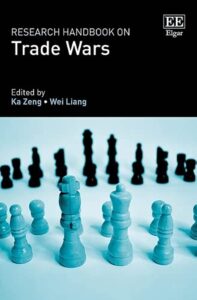
I’m pleased to share that my chapter “Economic Rivals, Security Allies: The US-Japan Trade War” has been published as part of the new Research Handbook on Trade Wars edited by Ka Zeng and Wei Laing. This edited volume provides an informative and in-depth account of the origins, dynamics, and implications of trade wars. My chapter traces the evolution of the US-Japan trade war from the late 1960s to the mid-1990s as it expanded beyond imports and exports to include broader macroeconomic, structural, and technological issues. Based on this analysis, it argues that the likelihood of trade conflict escalation increased as the perceived gap in relative economic power between Japan and the US decreased, as shared security interests and support for free trade norms weakened, and when relevant dispute resolution mechanisms were narrow in scope. Conversely, when these factors shifted in the opposing directions, the likelihood of trade conflict escalation decreased. This chapter devotes particular attention to the role of trade-security linkages in the trade war. Shared security interests were strengthened by positive substantive linkages between trade and Cold War aims; however, interests diverged when negative substantive linkages emerged between Japanese products and US defense capabilities and when tactical linkages were used to force concessions.
